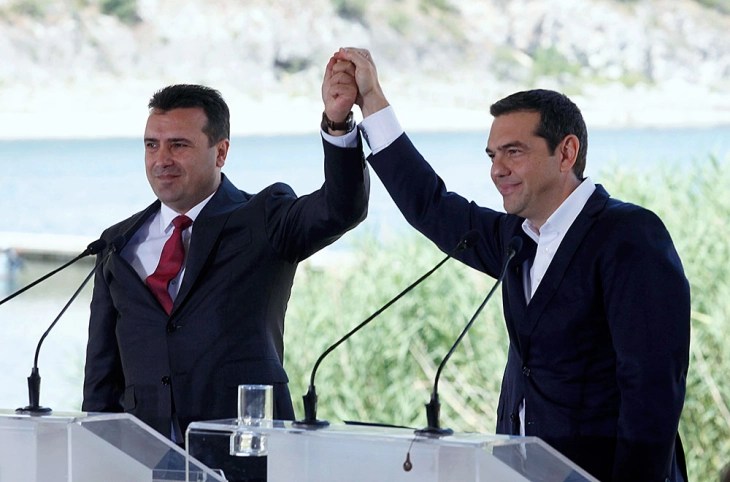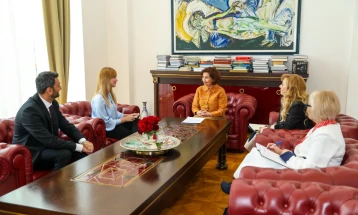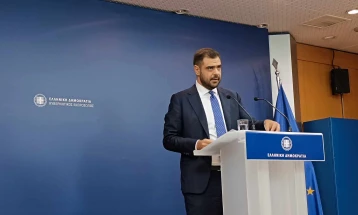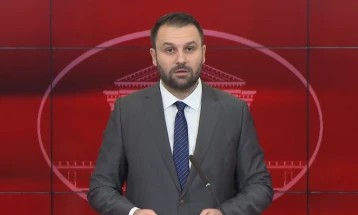Zaev and Tsipras: Without proactive approach, EU risks further unravelling in Western Balkans
- In a joint opinion piece for Euractiv, former prime ministers of North Macedonia and Greece, Zoran Zaev and Alexis Tsipras respectively, urge the EU and the international community to make it clear that respect of the Prespa Agreement is the only path to further democratic integration, European accession and pre-accession support.
- Post By Ivan Kolekevski
- 21:47, 12 June, 2024

Skopje, 12 June 2024 (MIA) - In a joint opinion piece for Euractiv, former prime ministers of North Macedonia and Greece, Zoran Zaev and Alexis Tsipras respectively, urge the EU and the international community to make it clear that respect of the Prespa Agreement is the only path to further democratic integration, European accession and pre-accession support.
Below is the opinion piece in full:
The Thessaloniki European Council of 2003 confirmed the European perspective of the region for the first time. However, by 2014 the momentum was lost and the enlargement process was officially “frozen” for five years.
The EU’s influence and role in the region eroded, benefitting state and non-state actors with dangerous agendas.
In this political vacuum, the countries in the region had to deal with the most serious refugee crisis since the Second World War, with over 1.1 million people crossing the Balkan route, while facing one political crisis after another.
When we met for the first time in Davos, in January 2018, we agreed on a few fundamental points: This situation could not continue. Our peoples and the region deserved better than to sink deeper into a vicious circle of instability and nationalism. Our goal would not be to pretend to negotiate, fail and then try to win the blame game, as we had seen others do.
We decided that our negotiators would not leave the room until we found a mutually acceptable solution, no matter the political cost we had to pay on our own.
On this basis, we instructed our foreign ministers, Nikos Kotzias and Nikola Dimitrov, to start negotiations. As expected, we faced strong backlash led by the conservative opposition parties – the current Prime Minister of Greece Kyriakos Mitsotakis and the winner of recent elections in North Macedonia, Hristijan Mickoski.
Despite this, we reached an agreement based on mutual respect of our national positions, set the foundations for building a strategic relationship between our two countries and was welcomed in Europe and beyond, as the most important and successful diplomatic initiative for peace in years.
The Agreement gave new momentum to the European perspective of the Western Balkans, restored the EU’s role in the region, and highlighted the importance of transatlantic cooperation in promoting peace and stability.
It also underscored the crucial role the UN can play in conflict resolution particularly since the Agreement was officially recognised by all members of the UN Security Council.
Most importantly, it proved that even when the burden of history is heavy, where there’s a will, there’s a way. Prespes – once a region torn apart by the most violent civil war in Cold War Europe, which forced thousands to leave their homes as refugees 75 years ago – today stands as a symbol of peace rather than conflict, of hope rather than pain.
Nevertheless, the past six years have not seen the developments we had hoped for. The European accession process of North Macedonia was blocked, first by France, and for the last few years by Bulgaria.
Tensions in Kosovo are increasing as the Brussels talks with Belgrade remain stagnant, and the rhetoric in Bosnia-Herzegovina is becoming more aggressive.
The momentum for enlargement in the Western Balkans is at high risk and does not seem be gaining strength, even with the decision to open accession negotiations with Ukraine and Moldova and recognize Bosnia-Herzegovina as a candidate country.
More and more young people are migrating, disappointed by their leaderships and by the inability or unwillingness of the EU to live up to its promise.
In a period of increasing global antagonisms, regional instability and conflict, Europe must take the lead as a force that pro-actively supports peace and stability on the basis of international law, wherever it is threatened. However, it can only establish itself as a strong international diplomatic force if it is reliable first in its own neighborhood.
Following recent elections in North Macedonia, the new leadership has made provocative statements, violating the letter and spirit of Prespa.
The EU and the international community must make it clear that respect of the Agreement is the only path to further democratic integration, to European accession and pre-accession support.
Its violation will further destabilise the region and lead to an existential challenge not only for North Macedonia’s European future, but for its future as a whole.
At the same time, if this condition is fully respected, the EU must be ready to leave behind any “business-as-usual approach” we have seen in the past six years and embrace a pro-active, staged approach to enlargement, as suggested by many European officials and experts.
It must be clear to all countries in the region, that the peaceful resolution of differences has benefits for the people of the Balkans and their leadership. That sacrifices are rewarded, not cynically disregarded.
As the extreme-right gains strength, democratic, moderate – and particularly progressive – leaders must cooperate and redouble their efforts to stand against nationalism and national retrenchment.
Highlighting the benefits of European unity will not be enough.
The only way to stand firm on European values in today’s world is to be pro-active in taking the decisions we all know are necessary despite their political cost. The decision to issue common debt in order to finance Next Generation EU, is a prime example of this kind of thinking.
In this spirit, on June 17-18 2024, exactly six years after the signing of the Agreement, our Institutes will be launching an International Conference on “Peace and Sustainable Growth” in Athens, hosting prominent government leaders and officials from across the democratic political spectrum and experts from across the world.
Our aim will be to support the implementation of the Prespa Agreement and highlight the responsibility of the EU and the international community in this regard.
Most importantly, we aim to open up an honest and forward-looking dialogue on the future of Europe and the region – a discussion that is today more necessary than ever, given the rise of the extreme-right, nationalism and regional instability.
MIA file photo







